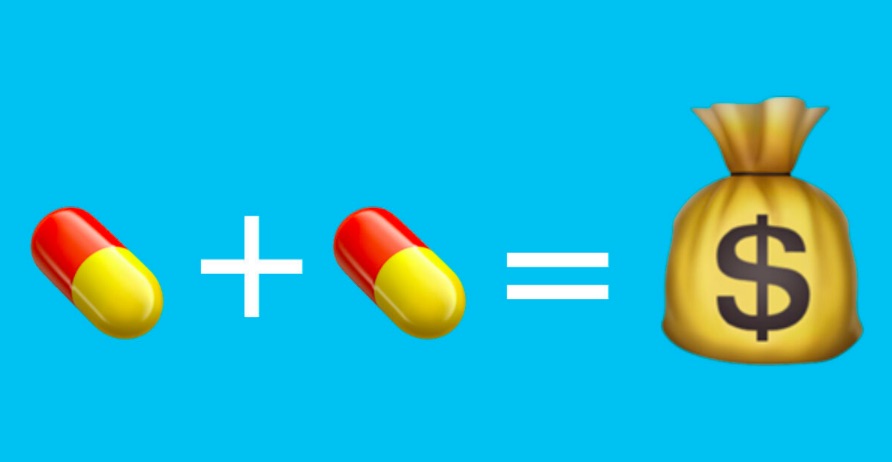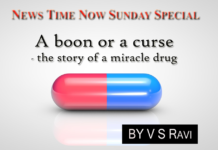News Time Now Sunday Special
The desire to take medicine is one feature that distinguishes man, the animal, from his fellow-creatures
WILLIAM OSLER
I have always been puzzled, by the” weight criteria” applied by pharmaceutical companies in manufacturing drugs and also the manner in which physicians prescribe them. Surely the Lord above would never have intended that drugs should be prescribed, only in random strengths of 20 mgs or 50 mgs or 100mgs or even 2.5 or 7.5 .
Why does a physician ask his patient to take two tablets of let us say Ampicillin( a penicillin antibiotic for respiratory infections) 500 mg twice every day instead of 483 mg? Why does he prescribe Flagyl metronidazole for amebiasis ) 200 mgs twice a day instead of say 183 mg? Would those17 mg make a difference or is it because even though 483 mg and 183 mg would be quite effective in the above two cases, the extra 17 mg would not cause any harm and would save the drug companies the trouble of having to measure minute doses in milligrams. I cannot think of any drug in the entire spectrum of pharmacopoeia which is not either manufactured or prescribed in this fashion.
Not convinced by the general explanation that drug companies do in fact make a scientific study under controlled conditions
I am not convinced by the general explanation that drug companies do in fact make a scientific study under controlled conditions and have chosen the option of multiples of 50 or 100, or 2. 5 and 7.5 as the case may be as the optimum figure for dispensing drugs, keeping all aspects in view. To illustrate this, let us refer to drugs in two categories: Imodium (Lopamide Hydrochloride) is prescribed for controlling diarrhoea.

In India, the drug is available as a capsule as well as a tablet. Patients are asked to take one tablet of 4 mgs initially, and one tablet of 2mgs after each movement of the bowel, assuming the diarrhoea is not viral or due to bacteria. But there are so many conditions such as ‘irritable bowel syndrome’, gastritis, colitis or conditions of extreme anxiety which can affect the gastrointestinal tract and trigger off a bout of diarrhoea.
You May Like To Read | Abandonment- Feature Story
The trouble with Imodium is that an overdose may lead to constipation for the relief from which a laxative has to be taken. No drug manual mentions anything about a ‘maintenance dose’ in chronic diarrhoea so that the frequency neither hampers normal activities, nor constipation immobilises the colon completely. The best course of action would be an ‘adjustment’ of dosage, by the patient himself by trial and error, something no doctor will advise him to do since Imodium may not be manufactured in that particular desired strength. In fact almost all patients of irritable bowel syndrome resort to this method with or without the knowledge or consent of their physician and do benefit from their approach.
Let us now turn our attention to the question of dispensing of drugs by Chemists;-
A scheduled drug can be sold by a chemist to a patient only if he produces a genuine prescription, issued by a licensed medical practitioner. The legal provision is clear and unambiguous and but in our country as in many other developing countries, one can obtain even a scheduled drug from a drugstore without producing a prescription because the rules regulating dispensing of drugs are honoured in the breach. Unscrupulous pharmacists, and slack supervision by enforcement agencies, have reduced the necessity of having to produce a prescription to a mockery. The medical community should also take the blame, for such a state of affairs, for doctors are hand-in-glove with pharmaceutical companies, hospitals, and diagnostic centres. In order to ensure the brisk sale of a drug, the pharmaceutical companies have to depend on doctors to prescribe only the drugs manufactured by them. The pharmaceutical companies compete with each other to cultivate a particular doctor targeted by them. Different companies sell the same drug under a different name e.g Atenolol beta-blocker is also sold as Tenormin by another company. Thus the doctor can prescribe either Atenolol or Tenormin. Similarly, Paracetamol is also sold as Dolo albeit of a slightly higher strength.
The companies will vie with each other and offer all sorts of incentives to make the practitioner prescribe their drug
Each company will generously distribute large quantities of drugs as free samples to the doctor( it is common knowledge that no doctor ever has the necessity to buy medicines for his family members ), and give expensive household gadgets as gifts; the type of lavish gift depends on the stature or the number of patients of a particular practitioner) and of late even foreign trips are also being arranged. The air tickets are purchased by the pharmaceutical company which also meets all the expenditure incurred by the medical practitioner, abroad including hotel accommodation and transportation in the cities he visits. The margin of profit by the sale of drugs is so astronomical, that drug companies are prepared to pay for everything. The doctor merrily enjoys the lavish hospitality, for all that he has to do is to prescribe that particular drug manufactured by the pharmaceutical company in question. It is a fact that the cost of production of a particular drug by the pharmaceutical company may cost only a few rupees, but it is sold at an exorbitant price by the pharmacies. To cite an example again, let us take a drug like Erythropoietin which is prescribed as an injection for anaemia to kidney patients. It costs less than twenty rupees to manufacture it, but it is sold as an injection cartridge for four or five thousand rupees by pharmacies. So is the case with many antibiotics, like penicillin and amoxicillin, anti-depressants like Mirtazapine, and Fluoxetine, some drugs prescribed to combat hypertension, and drugs prescribed to lower cholesterol. Irrespective of the financial status of the patient, the doctor will deliberately prescribe a drug manufactured by a multinational drug company which in return meets all the expenditure incurred by him. The margin of profit runs to several thousands of rupees in the case of drugs given for chemotherapy to cancer patients( of course there are extremely honest doctors as in every other profession who does not indulge in the above practices).

You May Like To Read | Peace in the Face of Death: Endorphins Calm the Nerves
There is one more issue I would like to discuss- the question of banning certain drugs. All physicians are aware of a drug named Spasmoproxyvon which used to be prescribed for relief from intractable stomach pain. It has been banned now and so no drug company manufacturers it because it is considered a “combination drug”. i.e a drug which is a combination of a few drugs. This is an absurd decision taken by a committee, presumably headed by a bureaucrat. Let me explain why. Spasmoproxyvon is a drug which contains Tramadol( which is available on prescription), Dicyclomine( which is also available on prescription) and paracetamol which can be bought over the counter. Several pharmaceutical companies used to make it with the strength of each of these three slightly varying The point is that even though Spasmoproxyvon is banned, all that a patient has to do is to buy all these three drugs separately, and mix them to make himself his own Spasmoproxyvon – a banned drug!
There is also another malpractice. A few doctors form a sort of chain, a well-knit team
There is also another malpractice. A few doctors form a sort of chain, a well-knit team. A general physician will send his patient to a particular specialist e.g a urologist or a skin specialist or a throat specialist even when there is no necessity. The specialist, in turn, recommends a battery of unnecessary tests to enable a diagnostic laboratory to make money at the expense of the poor patient who gets tossed to and fro. In some cases, unwarranted surgeries are performed on the patient. Big hospitals also have a major share of the profit. The patient is usually directed to a particular hospital by the doctor who is in league with that hospital. Thus every member of the team or chain is benefited, the pharmaceutical company, the doctor, the pharmacy, the diagnostic centre and the hospital. Only the poor patient is robbed to the point of bankruptcy. No person of moderate means can afford to stay in these hospitals which charge a higher tariff for their rooms than five-starred hotels. It is one vicious cycle which cannot be broken even by the most efficient investigating agency, in the country.

Of course, there are many extremely honest and dedicated doctors as in every other profession who do not indulge in the above malpractices. They never travel anywhere at the expense of the drug companies, and they do not recommend particular drugs, or unnecessary tests, or diagnostic laboratories, or Hospitals. They have to be respected and honoured as only they can set a good example to those who enter the noble profession.






















































